- Home
- Elizabeth George
A Place of Hiding Page 3
A Place of Hiding Read online
Page 3
China watched him. It seemed to her suddenly that all that was her life—her past and her future—was reduced by fire to this single moment. Knowing and not, simultaneously.
“What do you know about Matt?” she asked her brother.
Part of the answer she knew already. For the three of them had been teenagers together in the same ramshackle neighbourhood in a town called Orange where Matt was a surfer, Cherokee his acolyte, and China a shadow cast by both. But part of the answer she had never known because it had been hidden in the hours and the days that the two boys had gone alone to ride the waves in Huntington Beach.
“Forget it.” Cherokee moved past her and returned to the house.
She followed him. But he didn't stop in the kitchen or the living room. Instead, he walked straight through, swung the screen door open, and stepped onto the warped front porch. There he stopped, squinting out at the bright dry street where the sun beat down on the cars parked there and a gust of wind whooshed dead leaves against the pavement.
“You'd better tell me where you're heading with this,” China said. “You started something. You might as well finish it.”
“Forget it,” he said.
“You said pathetic. You said ludicrous. You said a game.”
“It slipped out,” he said. “I was pissed off.”
“You talk to Matt, don't you? You must still see him when he visits his parents. What do you know, Cherokee? Is he . . .” She didn't know if she could actually say it, so reluctant was she in truth to know. But there were his lengthy absences, his trips to New York, the cancellation of their plans together. There was the fact that he lived in LA when he wasn't traveling and there were all the times when he was at home but still too busy with his work to make a weekend with her. She'd told herself all this meant nothing, placed in the scales against which she measured their years together. But her doubts had grown, and now they stood before her, asking to be embraced or obliterated.
“Does Matt have another woman?” she asked her brother.
He blew out a breath and shook his head. But it didn't seem so much a reply to her question as it was a reaction to her having asked it in the first place.
“Fifty bucks and a surfboard,” he said to his sister. “That's what I asked for. I gave the product a good guarantee—just be nice to her, I said, she'll cooperate with you—so he was willing to pay.”
China heard the words but for a moment her mind refused to assimilate them. Then she remembered the surfboard all those years ago: Cherokee bringing it home and his triumphant crow, “Matt gave it to me!” And she remembered what followed: seventeen years old, never had a date much less been kissed or touched or the rest and Matthew Whitecomb—tall and shy, good with a surfboard but at a loss with girls—coming by the house and stammering an embarrassed request for a date except it wasn't embarrassment at all, was it, that first time, but rather the sweaty-palmed anticipation of collecting what he'd paid her brother to possess.
“You sold—” She couldn't complete the sentence.
Cherokee turned to look at her. “He likes to fuck you, China. That's what it is. That's all it is. End of story.”
“I don't believe you.” But her mouth was dry, drier than her skin felt in the heat and the wind that came off the desert, drier even than the cracked scorched earth where the flowers wilted and the rain worms hid.
She felt behind her for the rusty knob of the old screen door. She went into the house. She heard her brother following, his feet shuffling sorrowfully in her wake.
“I didn't want to tell you,” he said. “I'm sorry. I never meant to tell you.”
“Get out,” she replied. “Just go. Go.”
“You know I'm telling you the truth, don't you? You can feel it because you've felt the rest: that something's not right between you and hasn't been for a while.”
“I don't know anything of the sort,” she told him.
“Yeah, you do. It's better to know. You can cut him loose now.” He came up behind her and put his hand—so tentative a gesture, it seemed—on her shoulder. “Come with me to Europe, China,” he said quietly. “It'll be a good place to start forgetting.”
She shook his hand off and turned to face him. “I wouldn't even step out of this house with you.”
December 5
6:30 A.M.
ISLAND OF GUERNSEY
ENGLISH CHANNEL
RUTH BROUARD WOKE WITH a start. Something in the house wasn't right. She lay motionless and attended to the darkness as she'd learned to do all those years ago, waiting for the sound to repeat so as to know whether she was safe in her hiding place or whether she should flee. What the noise had been she couldn't have said in this moment of strained listening. But it hadn't been part of the nighttime noises she was used to hearing—the creak of the house, the rattle of a window in its frame, the soughing of wind, the call of a gull roused out of its sleep—so her pulse quickened as she worried her ears and forced her eyes to discriminate among the objects in her room, testing each one out, comparing its position in the gloom with where it stood in daylight, when neither ghosts nor intruders would dare disturb the peace of the old manor house in which she lived.
She heard nothing more, so she ascribed her sudden waking to a dream she couldn't remember. Her jangled nerves she ascribed to imagination. That and the medication she was taking, the strongest painkiller her doctor would give her that wasn't the morphine her body needed.
She grunted in her bed, feeling a bud of pain that flowered from her shoulders and down her arms. Doctors, she thought, were modern-day warriors. They were trained to battle the enemy within till the last corpuscle gave up the ghost. They were programmed to do that, and she was grateful for it. But there were times when the patient knew better than the surgeon, and she understood she'd arrived at one of those times. Six months, she thought. Two weeks until her sixty-sixth birthday, but she'd never see her sixty-seventh. The devil had made it from her breasts to her bones, after a twenty-year respite during which she'd got sanguine.
She shifted her position from her back to her side, and her gaze fell on the red digital numbers of the clock at her bedside. It was later than she'd thought. The time of year had utterly beguiled her. She'd assumed from the darkness that it was two or three in the morning, but it was half past six, only an hour from her usual time of rising.
From the room next to hers, she heard a sound. But this time it wasn't a noise out of place, born of dream or imagination. Rather, it was the movement of wood upon wood as a wardrobe door was opened and closed and a drawer in the chest was handled likewise. Something thudded quietly on the floor, and Ruth pictured the trainers accidentally falling from his hands in his haste to get them on.
He would already have gyrated his way into his bathing suit—that insignificant triangle of azure Lycra that she thought so unsuitable for a man of his age—and his track suit would be covering it for now. All that remained of his bedroom preparations were the shoes he would wear on his walk to the bay, and those he was putting on at the moment. A creak of the rocking chair told Ruth that.
She smiled as she listened to her brother's movements. Guy was as predictable as the seasons. He'd said last night that he intended to swim in the morning, so swim he would, as he did every day: tramping across the grounds to gain access to the outer lane and then fast-walking down to the beach to warm up, alone on the narrow switchback road that carved a tunneled zigzag beneath the trees. It was her brother's ability to adhere to his plans and to make them successful that Ruth admired more than anything else about him.
She heard his bedroom door closing. She knew exactly what would come next: Through the darkness, he'd feel his way to the airing cupboard and pull out a towel to take with him. That procedure would take ten seconds, after which he'd use up five minutes to locate his swimming goggles, which he'd have placed yesterday morning in the knife box or draped over the canterbury in his study or shoved without thought into that corner dresser that listed against th
e wall in the breakfast room. With the goggles in his possession, he'd be off to the kitchen to brew his tea, and when he had it in hand—because he always took it with him for afterwards, his steaming ginkgo-and-green reward for another successful dip into water too cold for ordinary mortals—he'd be out of the house and striding across the lawn towards the chestnuts, beyond them the drive and beyond that the wall that defined the edge of the property. Ruth smiled at her brother's predictability. It was not only what she loved best about him; it was also what had long given her life a sense of security that by rights it shouldn't have had.
She watched the numbers on her digital clock change as the minutes passed and her brother made his preparations. Now he would be at the airing cupboard, now descending the stairs, now rustling round for those goggles and cursing the lapses of memory that were becoming more frequent as he approached seventy. Now he would be in the kitchen, she thought, perhaps even sneaking a pre-swim snack.
At the point at which Guy's morning ritual would be taking him out of the house, Ruth rose from bed and wrapped her dressing gown round her shoulders. She padded to the window on bare feet and pulled aside the heavy curtains. She counted down from twenty, and when she hit five, there he was below her, coming out of the house, dependable as the hours of the day, as the December wind and the salt it blew off the English Channel.
He was wearing what he always wore: a red knitted cap pulled low on his forehead to cover his ears and his thick greying hair; the navy running suit stained at the elbows, the cuffs, and the thighs with the white paint he'd used on the conservatory last summer; trainers without socks—although she couldn't see that, merely knew her brother and how he dressed. He carried his tea. He had a towel slung round his neck. The goggles, she guessed, would be in a pocket.
“Have a good swim,” she said into the icy window pane. And she added what he'd always said to her, what their mother had cried out long ago as the fishing boat pulled away from the dock, taking them from home in the pitch-black night, “Au revoir et adieu, mes chéris.”
Below her, he did what he always did. He crossed the lawn and headed for the trees and the drive beyond them.
But this morning, Ruth saw something else as well. Once Guy reached the elms, a shadowy figure melted out from beneath them and began to follow her brother.
Ahead of him, Guy Brouard saw that the lights were already on in the Duffys' cottage, a snug stone structure that was, in part, built into the boundary wall of the estate. Once the collection point for rent from tenants of the privateer who'd first built Le Reposoir in the early eighteenth century, the steep-roofed cottage now served to house the couple who helped Guy and his sister maintain the property: Kevin Duffy on the grounds and his wife, Valerie, inside the manor house.
The cottage lights indicated that Valerie was up seeing to Kevin's breakfast. That would be exactly like her: Valerie Duffy was a wife beyond compare.
Guy had long thought that the mould had been broken after Valerie Duffy's creation. She was the last of a breed, a wife from the past who saw it as her job and her privilege to take care of her man. If Guy himself had had that sort of wife from the first, he knew he wouldn't have had to spend a lifetime sampling the possibilities out there in the hope of finally finding her.
His own two wives had been true to tedious type. One child with the first, two children with the second, good homes, nice cars, fine holidays in the sun, nannies, and boarding schools . . . It hadn't mattered: You work too much. You're never at home. You love your miserable job more than me. It was an endless variation on a deadly theme. No wonder he'd not been able to keep himself from straying.
Out from beneath the bare-branched elms, Guy followed the drive in the direction of the lane. It was quiet still, but as he reached the iron gates and swung one of them open, the first warblers stirred from within the bramble, the blackthorn, and the ivy that grew along the narrow road and clung to the lichened stone wall that edged it.
It was cold. December. What could one expect? But as it was early, there was still no wind, although a rare southeast promised for later that day would make swimming impossible after noon. Not that anyone other than he would likely be swimming in December. That was one of the advantages of having a high tolerance for cold: One had the water all to oneself.
That was how Guy Brouard preferred it. For swimming time was thinking time, and he generally had much to think about.
Today was no different. The wall of the estate to his right, the tall hedgerows of the surrounding farmland to his left, he strode along the lane in the dim morning light, heading for the turn that would take him down the steep hillside to the bay. He considered what he had wrought in his life in the past few months, some of it deliberately and with plenty of forethought, some of it as a consequence of events no one could have anticipated. He'd engendered disappointment, confusion, and betrayal among his closest associates. And because he'd long been a man who kept his own counsel in matters closest to his heart, none of them had been able to comprehend—let alone to digest—the fact that their expectations of him had been so wildly off the mark. For nearly a decade he'd encouraged them to think of Guy Brouard as a permanent benefactor, paternal in his concern for their futures, profligate in the manner in which he assured those futures were secure. He hadn't meant to mislead any of them with this. To the contrary, he'd all along fully intended to make everyone's secret dream come true.
But all that had been before Ruth: that grimace of pain when she thought he wasn't looking and what he knew that grimace meant. He wouldn't have realised, of course, had she not started slipping away for appointments she called “opportunities for exercise, frère” along the cliffs. At Icart Point, she said, she was taking inspiration for a future needlepoint from the crystals of feldspar in the flaky gneiss. At Jerbourg, she reported, the patterns of schist in the stone formed unequal grey bands that one could follow, tracing the route that time and nature used to lay silt and sediment into ancient stone. She sketched the gorse, she said, and she described with her pencils the thrift and sea-campion in pink and white. She picked ox-eye daisies, arranged them on the ragged surface of a granite outcrop, and made a drawing of them. She clipped bluebells and broom, heather and gorse, wild daffodils and lilies as she went along, depending on the season and her inclination. But the flowers never quite made it home. “Too long on the car seat, I had to throw them out,” she'd claim. “Wild flowers never last when you pick them.”
Month after month, this had gone on. But Ruth wasn't a walker of cliffs. Nor was she a picker of flowers or a student of geology. So all of this made Guy naturally suspicious.
He'd foolishly thought at first that his sister finally had a man in her life and was embarrassed to tell him so. The sight of her car at Princess Elizabeth Hospital had brought him round, however. That in conjunction with her grimaces of pain and her lengthy retreats to her bedroom had forced him to realise what he didn't want to face.
She had been the only constant in his life from the night they'd set off from the coast of France, making good an escape left far too late, on a fishing boat, hidden among the nets. She'd been the reason he himself had survived, her need for him a spur to maturity, to laying plans, and to ultimate success.
But this? He could do nothing about this. From this that his sister suffered now, there would be no fishing boat in the night.
So if he had betrayed, confused, and disappointed the others, it was nothing in light of losing Ruth.
Swimming was his morning release from the overwhelming anxiety of these considerations. Without his daily swim in the bay, Guy knew that the thought of his sister, not to mention his absolute impotence to change what was happening to his sister, would consume him.
The road he was on was steep and narrow, thickly wooded on this east side of the island. The rarity of any harsh wind from France had long allowed the trees to prosper here. Where Guy walked beneath them, the sycamores and chestnuts, ash and beech, made a skeletal arc that was grey etched on
pewter in the pre-dawn sky. The trees rose on sheer hillsides held back by stone walls. At the base of these, water flowed eagerly from an inland spring, chirping against stones as it raced to the sea.
The way switched back and forth on itself, past a shadowy water mill and a misplaced Swiss chalet hotel that was closed for the season. It ended in a minuscule car park, where a snack bar the size of a misanthrope's heart was boarded and locked, and the granite slipway once used to give horses and carts access to the vraic that was the island's fertiliser was slick with seaweed.
The air was still, the gulls unroused from their nighttime cliff-top resting places. In the bay the water was tranquil, an ashen mirror reflecting the colour of the lightening sky. There were no waves in this deeply sheltered place, just a gentle slapping of water on pebbles, a touch that seemed to release from the seaweed the constrasting sharp odours of burgeoning life and decay.
Near the life ring that hung from a spike long ago driven into the cliffside, Guy set down his towel and placed his tea on a flat-surfaced stone. He kicked off his shoes and removed his track suit's trousers. He reached into his jacket pocket for his swimming goggles.
His hand came into contact with more than just the goggles, however. Inside his pocket was an object that he took out and held in the palm of his hand.
It was wrapped in white linen. He unfolded this and brought forth a circular stone. It was pierced in the middle in the fashion of a wheel, for a wheel was what it was supposed to be: énne rouelle dé faïtot. A fairy's wheel.

 Well-Schooled in Murder
Well-Schooled in Murder Just One Evil Act
Just One Evil Act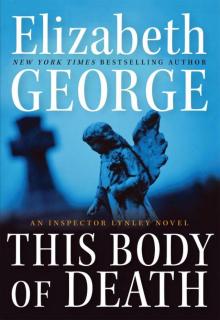 This Body of Death
This Body of Death The Edge of the Water
The Edge of the Water For the Sake of Elena
For the Sake of Elena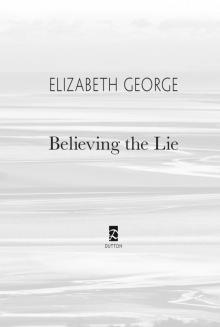 Believing the Lie
Believing the Lie The Edge of the Shadows
The Edge of the Shadows Just One Evil Act: A Lynley Novel
Just One Evil Act: A Lynley Novel In Pursuit of the Proper Sinner
In Pursuit of the Proper Sinner A Moment on the Edge:100 Years of Crime Stories by women
A Moment on the Edge:100 Years of Crime Stories by women Elizabeth I
Elizabeth I I, Richard
I, Richard A Traitor to Memory
A Traitor to Memory Missing Joseph
Missing Joseph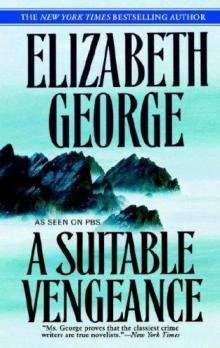 A Suitable Vengeance
A Suitable Vengeance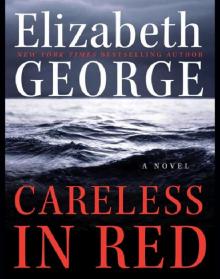 Careless in Red
Careless in Red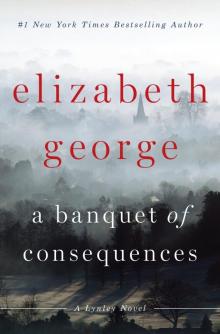 A Banquet of Consequences
A Banquet of Consequences Playing for the Ashes
Playing for the Ashes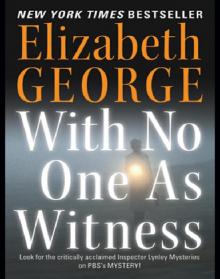 With No One As Witness
With No One As Witness Deception on His Mind
Deception on His Mind The Best American Mystery Stories 2016
The Best American Mystery Stories 2016 A Great Deliverance
A Great Deliverance In the Presence of the Enemy
In the Presence of the Enemy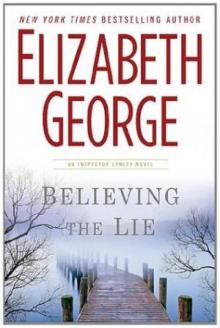 Believing the Lie il-17
Believing the Lie il-17 The Edge of the Light
The Edge of the Light SW01 - The Edge of Nowhere
SW01 - The Edge of Nowhere A Place of Hiding
A Place of Hiding What Came Before He Shot Her il-14
What Came Before He Shot Her il-14 Payment In Blood
Payment In Blood The Punishment She Deserves
The Punishment She Deserves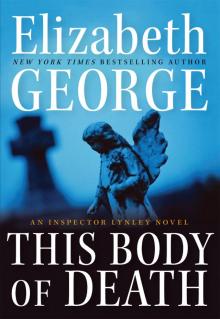 This Body of Death: An Inspector Lynley Novel
This Body of Death: An Inspector Lynley Novel Just One Evil Act il-18
Just One Evil Act il-18 What Came Before He Shot Her
What Came Before He Shot Her Missing Joseph il-6
Missing Joseph il-6